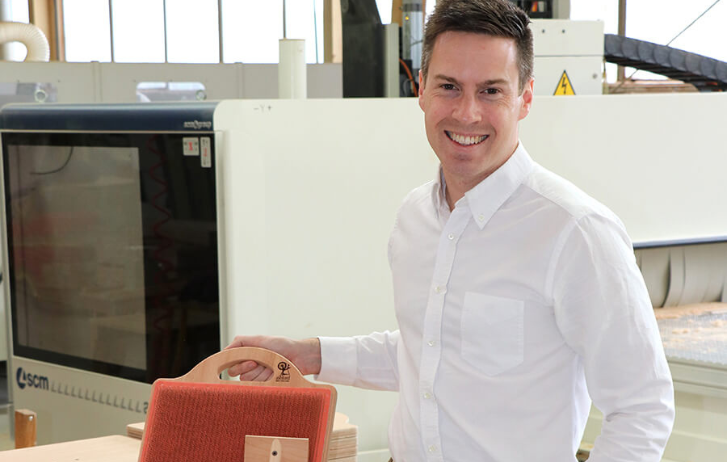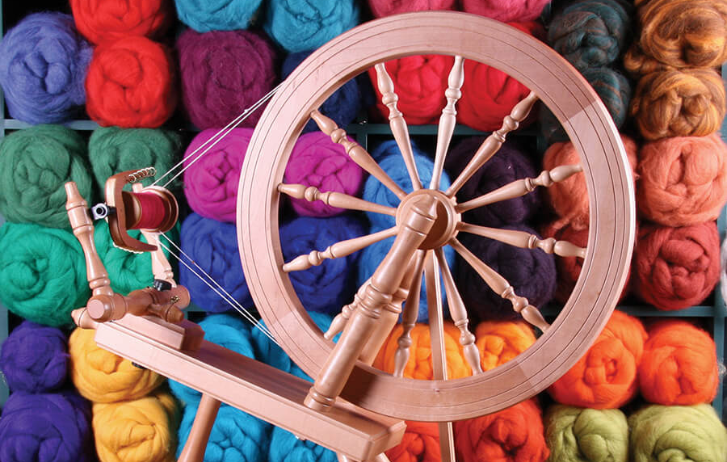
How A New Zealand Family Business Found Global Success
By FedEx | January 24, 2024
Some of the world’s best spinning wheels, weaving looms and other textile craft equipment are manufactured by Ashford Handicrafts. This is the story of how this local business successfully grew and expanded into global markets.
Spinning wheels and weaving looms might strike most people as relics of the past. But communities of textile artists and hobbyists around the world are still keeping traditions of hand weaving alive.
Supporting these communities with high-quality affordable textile equipment is Ashford Handicrafts, a third-generation family business based in New Zealand.
Introducing New Zealand’s Ashford Handicrafts
Ashford Handicrafts was established in 1934 by Walter Ashford, who started out producing wooden stools with woven seats. Later, he turned it into a mail-order business that shipped products in kit form.
This meant that customers would have to assemble products on their own – a model that would allow Ashford Handicrafts to keep their prices accessible.
In the 1940s, it introduced its first spinning wheel, which became a popular product among local knitters crafting woollen goods for World War II soldiers during winter.
In 2015, the business was passed down to James Ashford, the founder’s grandson and a former Wall Street-based software engineer, and his husband David Lester, originally an accountant. Under their leadership, the brand’s best-loved products have continued to improve technologically to meet the needs of modern consumers.
And a major part of the company’s continued success lies in bringing unique products to new markets.
How this family business successfully expanded internationally
1. Catering to eco-conscious consumers
One thing that sets Ashford Handicrafts apart from other SMEs is interweaving sustainability with every aspect of its business. Not only are activities like spinning and weaving inherently eco-friendly, the business also focuses on using sustainable materials. With the rise of eco-conscious consumers, Ashford Handicrafts aims to capture new customers with environmentally-friendly products.
Wheels and looms are made from natural silver beech (a native hardwood of New Zealand), sourced from a sustainably-managed mill approved by the Forestry Stewardship Council. Some products are finished with an environmentally friendly, water-based lacquer.
Ashford wool is also ethically produced and sourced from local grass-fed sheep. In the manufacturing plant, tech-enhanced machinery means production creates as little waste as possible and reduces overall energy consumption.
2. Choosing a reliable shipping partner
Critical to the company's success has also been finding a reliable, trustworthy transportation partner that understand their vision. Logistics companies also need to offer the right services at a competitive price point to help the business scale quickly.
The internet, technology, and seamless logistics have now connected the world in a way Walter could only dream about when he first started the business.
Working with FedEx has given the company access to an ever-expanding global network, including strong Trans-Tasman connections, and helped the business stay ahead of the curve with global market movements and sales trends.
Since working with FedEx, Ashford Handicrafts has been able to supply global customers almost as if they were local.
By finding a logistics partner early in the journey, Ashford Handicrafts was able to capitalize on trade opportunities as soon as they materialized. It made the idea of global expansion less daunting, as a lot of details are taken care of with the right logistics partner.
Since working with FedEx, Ashford Handicrafts has been able to supply global customers almost as if they were local. Deliveries have been fast and efficient to both key and emerging markets.
They’ve also started using the FedEx API (Application Programming Interface), and haven’t looked back since.
The future of Ashford Handicrafts
Thanks to expansion into other markets, the business has grown to a team of over 45 employees in New Zealand. Over 90% of products are exported, shipping to over 40 countries including India, Taiwan, Thailand, Singapore, and South Africa. Most customers are based in the United States, Australia, Canada, United Kingdom and Europe.
Currently the one of largest manufacturers of weaving equipment globally, Ashford Handicrafts still sees more opportunities for international growth, and strives to be in every yarn store in the world.
With FedEx as its logistics solutions provider, the company is confident it will be able to handle increasing demand and maintain a seamless shipping experience.
Need more tips and tools for taking your business global? Our teams at FedEx are experts – we’ve been helping our customers go global for decades. Visit our e-commerce center here.
SHARE THIS STORY
- How To Ship A Giant Panda
- How To Make Freight Shipments Work For Your Small Business
- The Rise Of Intra-Asia Trade: Opportunities In The China-Southeast Asia Corridor
- Southeast Asia's Role In Global Manufacturing Supply Chains
- 8 Most Unusual Shipments In The History Of FedEx
- Where Do Old Planes Go When They Retire?
Sign up now and save on your shipping rates!
Sign up now and earn discounts by shipping instantly with FedEx Ship ManagerTM at fedex.com.
Recommended For You

How A Filipino SME Conquered The Global Luxury Packaging Scene
Filipina-led company Consummare are responsible for decadent, custom-designed boxes that house some of the world’s most prominent luxury brands.
Read More
How To Use Automation To Enhance Your E-Commerce Business
Automated tools can help you ship more efficiently, freeing up time and resources to focus on other parts of your business.
Read More
How To Grow Your E-Commerce Brand In A Digital Economy
From e-commerce platforms for cross-border trade to next-generation logistics, discover the digital economy opportunities that benefit your business.
Read More



